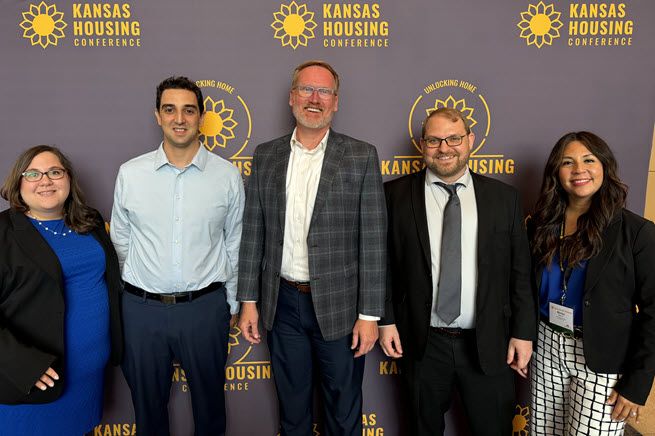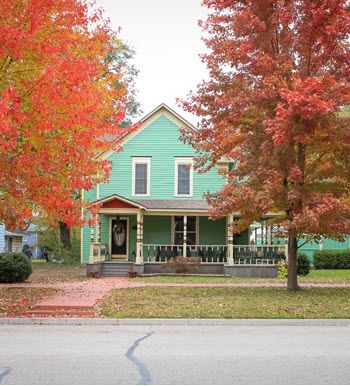More than 700 Kansans explored promising ways to address the state’s housing needs during the 2024 Kansas Housing Conference hosted by Kansas Housing Resource Corporation (KHRC) August 20-22 at the Overland Park Convention Center in Overland Park, Kan.
The Federal Reserve Bank of Kansas City’s Community Development team is a long-time collaborator with KHRC on the Kansas Housing Conference, now in its 19th year. In 2024, team members served on the steering committee and presented two breakout sessions on housing issues affecting Kansans.
Two Kansas City Fed researchers, Elior Cohen, economist in Economic Research, and Steven Howland, senior researcher with Community Development, shared data at the conference on housing trends for low- to moderate-income (LMI) populations. Cohen and Howland discussed trends related to renters and owners, people experiencing homelessness, and housing production.

Several Kansas City Fed staff members participated in the 2024 Kansas Housing Conference. From left to right: Rachael Surmick, community development advisor (Omaha); Elior Cohen, economist; Jeremy Hegle, assistant vice president and community affairs officer; Steven Howland, senior research; and Marisa Martinez, community development advisor (Kansas City).
Some highlights of their research:
- 70% of renters earning under $30,000 per year are considered housing cost burdened, meaning they pay more than 30% of their income on housing. When the cost of utilities is included, the number of cost-burdened renters increases to 77%.
- Since the Great Recession, fewer homes, both single- and multi-family, were built than were built before the recession. The result is a significant housing deficit. Howland and Cohen cited an estimate from the National Low Income Housing Coalition of a deficit of approximately 52,000 units for households earning at 30% of the area median income.
- After dropping 36% from 2006, residential construction employment is still down 16%, contributing to both a limit to the number of houses that can be built and to an increase in the price per home.

In addition, Marisa Martinez and Rachael Surmick, both Community Development advisors at the Kansas City Fed, facilitated a panel focused on exploring practical approaches to increasing affordable housing supply, specifically through accessory dwelling units and community land trusts.
Panelists included:
- Ulysses “Deke” Clayborn, regional administrator, U.S. Department of Housing and Urban Development,
- Ben Chmiel, senior planner, City of Manhattan,
- Kyle Ferden, executive director, Kansas City Community Land Trust, and
- Lloyd Rainge, vice president of community development, Capitol Federal Savings Bank.
The panel blended perspectives from community-based organizations that have launched programs to increase affordable housing inventory with the perspectives of financial institutions and government. Together, they said, these groups can bring programs to reality.
“Financial institutions play such an important role supporting affordable housing and its development,” Lloyd Rainge said. Rainge also serves on the Kansas City Fed Community Development Advisory Council. “I was excited to discuss the partnerships we foster with community-based organizations to support innovative tools.”
Many organizations work hard to close gaps in housing supply and quality in Kansas. Other breakout sessions explored housing policy, successful landlord engagement programs, the impact of housing typology on neighborhoods, and much more.
Next year, the Kansas Housing Conference will celebrate 20 years of engaging Kansans. Programs like these are catalysts for the creativity that communities require to fully meet the housing needs of individuals across all income levels.
